|
|
|
Sort Order |
|
|
|
Items / Page
|
|
|
|
|
|
|
| Srl | Item |
| 1 |
ID:
134340
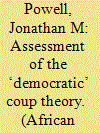

|
|
|
|
|
| Summary/Abstract |
The Egyptian military's unconstitutional removal of President Mohamed Morsi has reignited a debate regarding the theory of the ‘democratic coup’. Though coups are almost invariably condemned, many political observers and a few scholars have recently argued that coups can act as catalysts for democratisation. This paper empirically assesses the democratic coup hypothesis for Africa. Multivariate analyses from 1952 to 2012 suggest that coups statistically improve a country's democratisation prospects. Extensions of the model show that coups appear to be likely precursors for democratisation in staunchly authoritarian regimes and have become less likely to end democracy over time, and that their positive influence has strengthened since the end of the Cold War. As of 2012, countries that have experienced a recent coup are expected to be four times more likely to witness a democratic transition than those that have remained coup-free.
|
|
|
|
|
|
|
|
|
|
|
|
|
|
|
|
| 2 |
ID:
145103
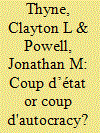

|
|
|
|
|
| Summary/Abstract |
This paper considers how coups impact democratization. Current research focuses on coups as a threat to consolidated and fledgling democracies. Policymakers have adapted to this viewpoint by treating coups as unjustifiable maneuvers that must be curtailed, with states frequently terminating aid and IOs suspending membership following a coup. While coups clearly confound democratic consolidation, it is notable that the vast majority of coups do not happen in democracies. Therefore, we focus on authoritarian regimes in seeking to discover how coups might open paths toward democratization. We first argue that successful coups should promote democratization because leaders have incentives to democratize quickly in order to establish political legitimacy and economic growth. Second, we view failed coups as credible signals that leaders must enact meaningful reforms to remain in power. Empirical analyses strongly support the argument that coups promote democratization, particularly among states that are least likely to democratize otherwise.
|
|
|
|
|
|
|
|
|
|
|
|
|
|
|
|
| 3 |
ID:
103724
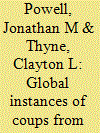

|
|
|
|
|
| Publication |
2011.
|
| Summary/Abstract |
Once considered a 'hot topic' among scholars, research on coups d'état has waned in recent years. This decline is surprising given that 7 coups have happened between January 2008 and December 2010, bringing the last decade's total to almost three dozen. One explanation for the lack of coup research is the absence of a temporally and spatially comprehensive dataset to test theories. Also absent is a discussion of what makes coups distinct from other forms of anti-regime activity. This article seeks to remedy these problems. The authors present a new dataset on coups from 1950 to 2010. They begin by explaining their theoretical definition and coding procedures. Next, they examine general trends in the data across time and space. The authors conclude by explaining why scholars studying a variety of topics, including civil wars, regime stability, and democratization, would benefit by paying closer attention to coups.
|
|
|
|
|
|
|
|
|
|
|
|
|
|
|
|
| 4 |
ID:
128972
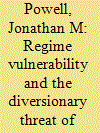

|
|
|
|
|
| Publication |
2014.
|
| Summary/Abstract |
In this article, I move beyond prior efforts to explore the relationship between the risk of a coup and international conflict by considering alternatives that leaders can utilize to strengthen their regimes. I offer two theoretical expectations. First, I theorize that leaders lose the incentive and ability to use diversion when the structural coup-proofing apparatus is strengthened. Second, I expect military finances to lead to disparate behavior when considering regime type. Autocrats are expected to use military funds to provide private incentives to the armed forces, largely in the form of allowances. Democracies, in contrast, will be required to use expenditures to promote the public good of national security due to the transparency of their regimes. Autocrats are expected to lose the incentive to use diversion as the financial endowment of their militaries increase, while democracies will continue to show a diversionary trend due to their increased military capabilities. The theory is tested using global data from 1962 to 2000, with the findings strongly supporting the theory.
|
|
|
|
|
|
|
|
|
|
|
|
|
|
|
|
| 5 |
ID:
135229
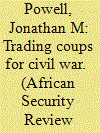

|
|
|
|
|
| Summary/Abstract |
This paper investigates civil conflict as a product of the survival strategies of African leaders. Specifically, the paper offers a theory of risk substitution that predicts coup-fearing leaders will undermine the military effectiveness of the state when making an effort to extend their own tenure. While ‘coup-proofing’ practices have often been noted as contributors to political survival, considerably less attention has been paid to the influence of these strategies on other forms of conflict. Utilising data from a number of cross-national datasets, the analyses show that having a higher number of ‘coup-proofing’ counterweights significantly worsens a state's civil conflict prospects. A brief consideration of multiple episodes of conflict further suggests that in addition to coup-proofing undermining the counterinsurgency capacity of the state, some leaders are simply indifferent to – or can even potentially benefit from – the existence of an insurgency.
|
|
|
|
|
|
|
|
|
|
|
|
|
|
|
|
|
|
|
|
|